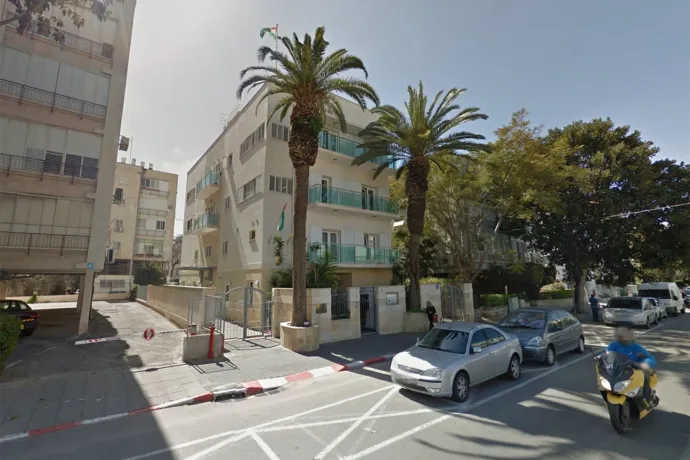
The Hungarian government is relocating Hungary's embassy in Israel from Tel Aviv to Jerusalem in April, the Times of Israel reports, making Hungary the first EU member state to do so. According to the Israeli paper, Hungarian Foreign Minister Péter Szijjártó and Israeli Foreign Minister Eli Cohen have agreed on the move in recent days. Senior sources in the Israeli Foreign Ministry have confirmed the transfer of the Hungarian Embassy. The move has been linked to Orbán's desire to help Benjamin Netanyahu, to deliver a diplomatic victory to the Israeli prime minister and his government amidst the controversial overhaul of the judicial system.
Few people will drop their phones upon first reading this news, so it is worth taking a look at the gigantic diplomatic hornets' nest the Hungarian government is stirring up with this move.
The diplomatic significance of the move is that embassies, i.e. the highest diplomatic missions, are almost always located in capitals, according to customary law and international practice, so the Hungarian government's gesture means that it recognises Jerusalem as Israel's capital instead of Tel Aviv.
One city, three religions, two capitals
Israel itself considers Jerusalem to be its capital, with its state organs located there, but the problem is that the majority of the international community does not consider this interpretation to be legitimate and acceptable. So far, apart from Guatemala, Honduras and Kosovo, which is only vaguely recognised as a sovereign state, the only major country to have established an embassy in Jerusalem was the United States, at the time of Donald Trump's presidency. Other countries’ embassies are located in Tel Aviv, which Israel also considered its capital until 1980, while Jerusalem only has consulates-general.
This diplomatic reticence serves as a reminder to the international community that although Jerusalem is de facto under full Israeli control, this does not mean that the Jewish state can fully assert its claim to it.
The decades-long status dispute is terribly complex, but perhaps it can be summarized briefly and fairly as follows:
The 1947 UN resolution that partitioned the British colony governed under the name of "Palestine" originally envisioned the city under joint Israeli-Arab sovereignty. However, this plan went up in smoke when the western half of Jerusalem was occupied by Israel in 1948 and the eastern half by Jordan; the city was finally brought under the full control of the Jewish state in the 1967 Six-Day War.
In 1980, Israel designated Jerusalem as its 'united and indivisible' capital in its Basic Law, and since then, each Israeli government has fiercely clung to this status, with the unanimous support of the Israeli public on the issue. Meanwhile, in the conventions for Israeli-Palestinian reconciliation and the settlement of disputed issues, such as the Oslo Peace Accords of 1993 or the 2003 Road to Peace, Israel has also recognised that the status of Jerusalem should be settled through negotiations between the two parties.
In the 13th month of the Russian invasion of Ukraine, it may not be necessary to argue at length that the fact of conquest does not in itself create a right; but the international community rejected the forcible acquisition of territory as early as 1980. The designation of Jerusalem as the capital was promptly declared an annexation by the UN Security Council and declared null and void – a vote in which the United States, which has often defended Israel, abstained and did not veto.
Jerusalem – precisely the eastern part of it – is also considered the capital by the Palestinian Authority, which is effectively based in Ramallah in the West Bank (to complicate the status dispute further, the Palestinian Authority is not a sovereign state entity and, moreover, it did not recognise Israel's existence until 1993). Despite the trends of the past decades, the systematic dismantling of Palestinian neighborhoods and the religiously and politically motivated mass settling of Jews in East Jerusalem today, about a third of the city's population of almost one million is still Palestinian.

The holy city (considered holy by three world religions) with a troubled past remains a powder keg in the 21st century, and the far-right coalition partners of Benjamin Netanyahu, who returned to power after the 2022 elections, have already begun provocative activities challenging the holy status of Jerusalem's holy sites.
Until recently, the international community has been careful to maintain diplomatic ambiguity and not to combine the acceptance of Israel’s control over Jerusalem with the recognition of their sovereignty over the city.
When Orbán only followed Trump from afar
Who else could have upset this delicate balance (which, given the lack of opposition to the Jewish settlement movement in the West Bank, was only really a balance at the level of diplomatic notes), but Donald Trump. In 2017, the former US president willingly bowed to the combined pressure of pro-Israel lobbying organisations and evangelical Christian denominations representing an important slice of the Republican electorate in US politics to declare that the US would recognise Jerusalem as Israel's capital, and six months later the diplomatic mission was effectively relocated from Tel Aviv.
Although the vociferous international protest was joined at the time by the then opposition Democratic Party, the decision was not disturbed by Joe Biden, since he took office in 2021.
Despite apocalyptic expectations, the move did not lead to an escalation of the Israeli-Palestinian conflict, but the US example was followed by few others – and after initial enthusiasm, Australia and Paraguay moved their embassies back to Tel Aviv.
Due to the extensive political ties between Viktor Orbán and Benjamin Netanyahu, following Trump's decision Hungary was immediately mentioned as one of the countries that might move its embassy to Jerusalem (any such move was an important symbolic victory for Israel), but in the end it only resulted in the Hungarian government opening a "foreign economic mission" in Jerusalem, just in time for Viktor Orbán's 2019 visit to Israel. In December, when I inquired about the possibility of moving the Hungarian embassy to Jerusalem, the press department of the Ministry of Foreign Affairs and Trade responded briefly, saying that "Hungary has already opened a foreign economic mission in Jerusalem in 2019", and did not answer my queries for clarification.
The move of the embassy fits perfectly with the policy of Hungarian diplomacy towards Israel. In recent years, the Hungarian government has consistently blocked joint EU resolutions on the Israeli-Palestinian conflict – even as the sole member state to do so – and has always argued that even the mere mention of Israel's responsibility indicates "imbalance".
In 2019, Orbán even vetoed EU resolutions condemning the Israeli settlement movement and the atrocities committed against Palestinians – it is a typical sign of the lack of gravity of Hungarian diplomacy that the resolution was presented as a joint EU resolution at the UN despite the veto. This diplomatic posturing proved very rewarding for Orbán in a number of areas: he defended the 2017 anti-Soros billboard campaign (built on obvious anti-Semitic topos) even against Netanyahu's own ambassador in Budapest, and it was sometime during this period that he may have given permission to the Israeli company, NSO to export the Pegasus spy software to Hungary.
We have asked the Foreign Ministry about the reasons for the decision and how the move will be handled, and received the following response: “The trade section of our embassy in Israel was moved to Jerusalem years ago. The opening was announced jointly by Foreign Minister Péter Szijjártó and Prime Minister Benjamin Netanyahu. We will provide updates on any changes affecting the embassy.”
For more quick, accurate and impartial news from and about Hungary, subscribe to the Telex English newsletter!